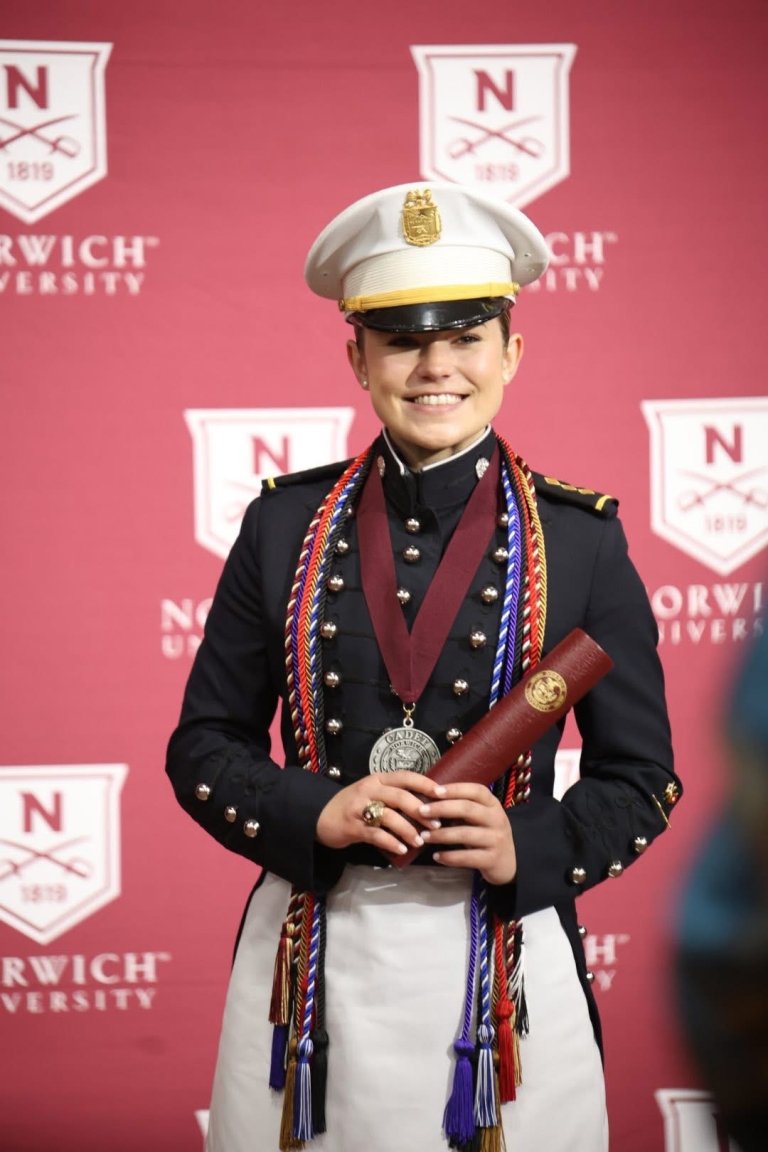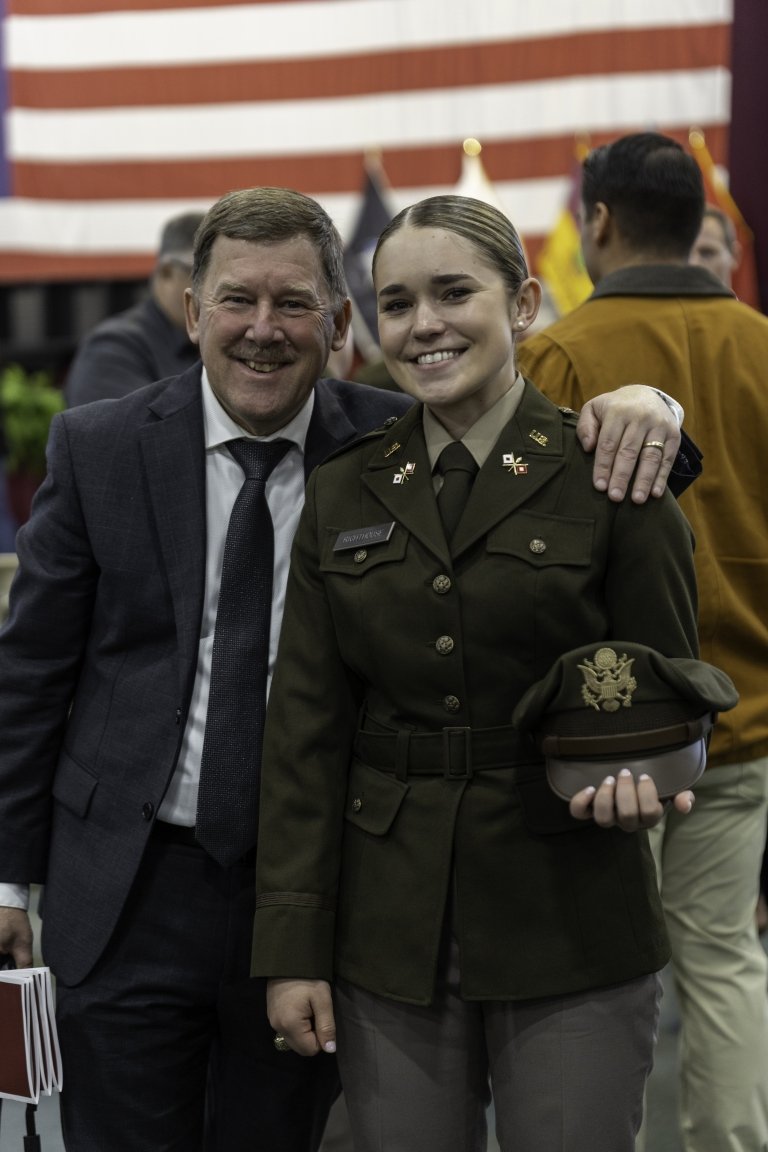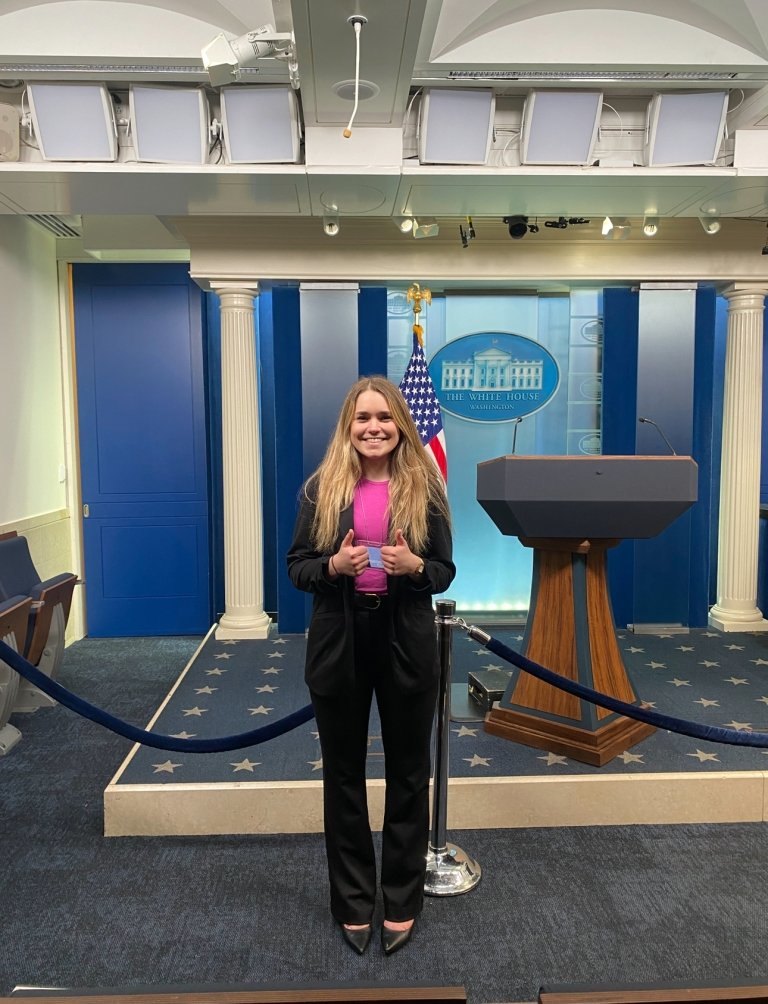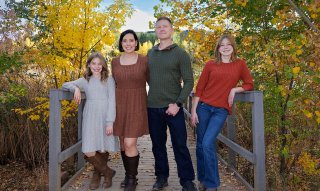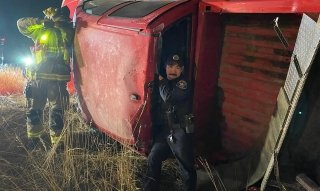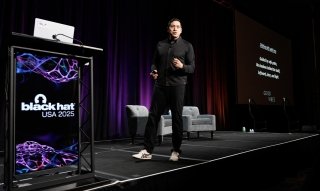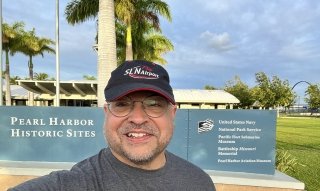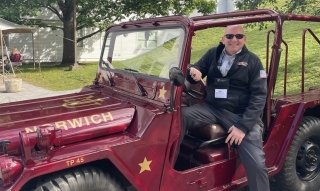Sophia Righthouse
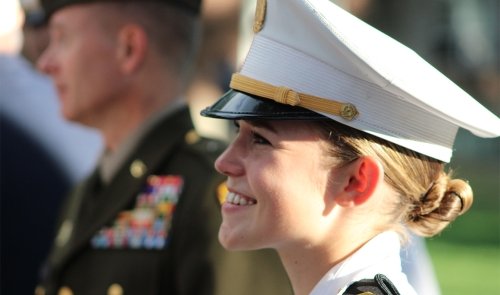
There’s a difference between undergrad and grad, primarily because it's online and it's a lot more self-paced and self-studied. I think that what has really helped is that your classmates and the teacher are very accessible.
Q: “Let’s start off by talking about which undergraduate programs you completed and what graduate program you selected to pursue.”
A: “I came to Norwich with an Army Reserve Officers' Training Corps (ROTC) scholarship specifically for political science. I was excited that the Army gave scholarships for social studies majors because I knew it was very challenging to get those majors with the Air Force or Navy. Very quickly, I realized that I was almost done with my political science degree.
During my sophomore year, I decided that I wanted to get a degree in English as well. English is so important, it's a part of our everyday lives, and I don't think enough people get English degrees these days. I also minored in leadership studies, which a lot of the Corps [of Cadets] students end up getting just because of the ROTC credits and leadership classes that we take as part of the program.
My master's program is international relations, which stems from my love of political science. I selected a concentration in cyber diplomacy because I'll be going into the Signal Corps in the Army, and modern signal is heading more into the cyber route. I want to make sure that I'm well-versed before I meet my unit [as an officer].”
Q: “You’re in the first class of your graduate program currently. Was the difficulty increase from undergraduate to graduate studies manageable?”
A: “There’s a difference between undergrad and grad, primarily because it's online and it's a lot more self-paced and self-studied. I think that what has really helped is that your classmates and the teacher are very accessible. There are plenty of discussions, so you don't really feel like you're alone in your class online. I know the students who are in the class with me, and I talk with them quite regularly over discussion posts.
I don't get to see my teacher face to face and interact with them that way, but I still really enjoy the online format and speak with my teacher multiple times each week.”
Q: “You’ve got an incredible drive. What inspires you to push so hard for education?”
A: “I think that obtaining an education is a privilege that a lot of us don't really utilize to the maximum capacity. Education is the one thing that can really help you, whether it's in the military, the private sector, or the public sector, because the more that you know, the better you're going to do. Even if you're not learning specific facts about your job, you're learning people skills, and you're learning how to work with other students. I've always just loved education. I love learning new things and trying to get a better grasp of the things that are around me.”
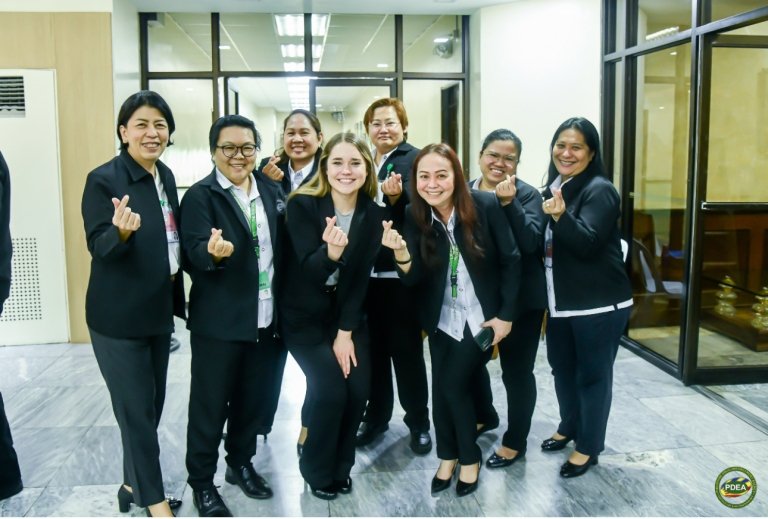
Q: “Will your education set you ahead of your peers now that you're embarking upon your journey as an Army officer?”
A: “It could, but I also think that the value of education is that you can also spread what you learn. Hopefully, through my education at Norwich, I can go to my future unit and spread the knowledge that I have gained at Norwich. I want to enable others who may not have been afforded the same opportunities to gain some of the benefits of my education.”
Q: “What aspects of Norwich's military community had the most impact on your growth?”
A: “Freshman year, as a Rook, I immediately met military members who were active, retired, or in the National Guard. Those connections grew from freshman year, all the way to senior year. To me, this was the biggest impact because I wasn't just surrounded by people who wanted to do the same thing as me in the future; I was with people who were already doing it. They were like-minded, motivated, dedicated, and committed to Norwich, the military, and their families. That really made an impact on me. You can go to any college and get a great alumni base, but going to Norwich, even if you're not planning on going into the military, gives you that military discipline. Having an alumni base that really pushes you to grow and does more than just give you job opportunities here and there really makes a difference.”
Q: “Why did you decide to stay with Norwich for your graduate degree rather than attend anywhere else?”
A: “For me, it was about trusting the institution that built me. I earned two great degrees from Norwich, I loved my professors, I loved the students, and I really enjoyed how Norwich taught. The instructors were fact-based, and overall, Norwich values aligned with my own morals. I knew that if I were to do the master's program through Norwich, I would get the same high-quality education that I got in my bachelor's.
If I were to go to a different institution, I wouldn’t be sure of the standards and expectations. I trusted Norwich to provide me with a great education.”
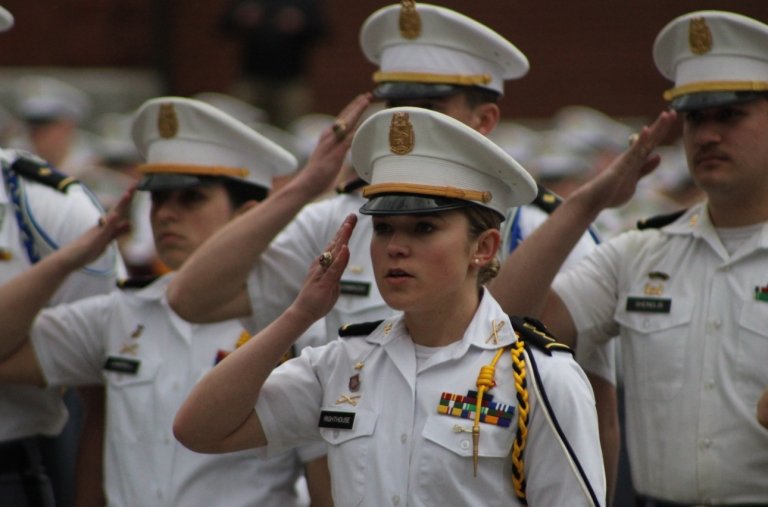
Q: “You selected cyber diplomacy as your concentration, mentioning that it will be useful as a Signal Officer. Can you elaborate on that?”
A: “Signal is growing in the army. To me, that’s clear from how many 2nd lieutenants they're bringing in, and a lot of Signal has been going into the cyber domain because everything's going online now. Cyber diplomacy, to me, is learning how to be civil online. It’s something that nobody really talks about. It’s also about learning how to cooperate with different countries that we may not necessarily be on the best of terms with online. I think it is unique, and I've never seen this concentration offered anywhere else.”
Q: “Was it a smooth transition from on campus to online?”
A: “Definitely. We use the same programs and software online and in person. It was easy to transition, and of course, the move was made in the 'Norwich' fashion. I selected Norwich originally for my undergraduate studies because I was able to talk to different representatives from Norwich and students from Norwich. I really enjoyed that because when I reached out to other schools and other military academies, I didn't receive the same welcome. The fact Norwich did that was great, and in a similar fashion, I was reached out to immediately by the online program, put with a counselor, and had a meeting about what the six classes would look like. My teacher reached out two weeks before the class even started to make sure that I was able to get into the program and see the different textbooks. In my experience, it was seamless.”
Q: “Would the online interface be intuitive for someone who's not familiar with it from an undergraduate level?”
A: “Yes. I think that it is clear and lays out what you're supposed to do and the expectations that you need to meet. In my International Studies class, it's clear what your homework is, what the assignments are, and what the discussions are. There are plenty of forum posts for you to post and to ask your teachers or fellow students questions.”
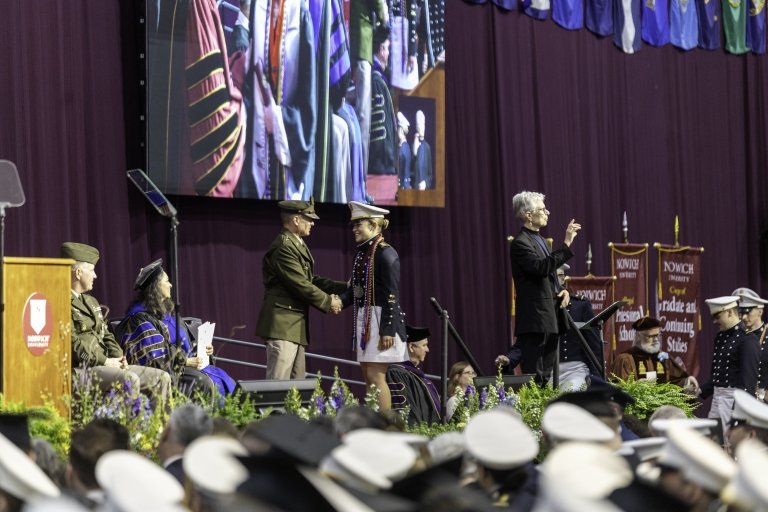
Q: “Are you working while studying, or is school your full-time gig right now?”
A: “For this quarter, it's just school, but I will be heading to Basic Officer Leader Course (BOLC) in July for the Army. I will overlap the end of this quarter with the beginning of BOLC for two or three weeks, which shouldn't be too big of an issue. Then I'll continue my master's degree through my time in BOLC and finish while I am a platoon leader (PL).”
Q: “What has been the most beneficial aspect of the online format for you?”
A: “The online format is conducive to and understanding of the students' time, and the fact that every student is a little bit different. Right now, I'm not working, but when I am working and I go to BOLC, I won’t need to worry about my assignments because nothing is due at specific times, and there are no specific classes at certain times. I'm able to do it on my schedule. For example, if you have one day that's free, you could knock out all of your homework and all of your reading. Additionally, it’s not forcefully spaced out, which I think is helpful. I know a lot of online programs are like that, where you have something to do every single day, and that can be hard for somebody who's working or is in the military.”
Q: “You received the Distinguished Scholars Scholarship to support your graduate studies. What did that mean to you, and how did that help shape your goals?”
A: “College is important to me in general. Neither of my parents went to college; they were both police officers. Coming into college was already a little bit confusing for my family and me because we hadn't done it before. The ROTC scholarship for my bachelor's was helpful in just helping pay for a lot of the classes and supplies.
Unfortunately, when you get the ROTC scholarship, you cannot receive funding for post-graduate education until you complete a few years of service. This made paying for college a challenge for my family and me, so when I got an email from Norwich talking about scholarships, it was great. Not only do I not have to wait to continue my education, but it also relieves the pressure on my family as I start my career.”
Q: “What advice do you have for undergraduates who might be in the same situation as you when seeking a graduate degree? What are some things that they should look out for or things that they should be doing?”
A: “Take every opportunity that you can. Apply for every email that offers any sort of scholarship or funding, even if you don't know if you'll get it. Because when one door opens, once you walk through it, there's going to be more and more doors that do.
But you would never reach those doors unless you clicked on that one email and applied for that one scholarship. Also, there are plenty of people out there who are more than happy to help you receive an education, and that's the great thing about Norwich. Reach out, ask for help from alumni, even just to see what they did when they were in your shoes, is helpful.
I think just like putting yourself out there is just the hardest thing in general, and I don't think that it necessarily is negative when you don't receive something, because there are plenty of other things that you can receive. For example, I applied for the Distinguished Scholars Scholarship, and even if I hadn't gotten it, I still got my name out to the director in charge of Norwich's online program. There are plenty of other things that could have been offered if I had not gotten them, so it's still an open door either way.”
Q: “Long term, how do you envision your degree in international relations influencing your Army career and then later in life, your civilian career?”
A: “I actually got lucky enough for my first base assignment to be in Germany, and I'm very excited about that. I think the international relations will help just in the fact that I'm not focused and centralized on American politics and government, but I'm getting a good grasp on how other countries function. In Germany, I'll be working with a lot of foreign officers, which my international relations degree will help with. After Germany, I really want to work in open-source intelligence or in an analyst role and learn how the world works. I think it is important to look at the broader image rather than just focus on our own politics, issues, and concerns.”
Q: “Are you open to pushing as far as you can in the Army, or are you looking at it more as filling your service obligation and returning to the civilian sector?”
A: “As long as I'm happy and I'm enjoying what I'm doing in the Army, I’ll stay. I love the atmosphere of the Army. After four years in the Corps at Norwich and living that type of lifestyle, I really have no issue with the early mornings, the late nights, or working out. I love the disciplined lifestyle.”
Q: “What would you say to somebody who's considering Norwich online?”
A: “The best way to explain Norwich to someone is that you're not just buying into a degree, you're buying into an institution and a family. Something that is specific to Norwich, which is not shared by a lot of other schools, is that you get the reputation of the school when you get your degree. You're getting the understanding from people who have been there or know people who went there (which is a very wide population) that you're a trustworthy person. They know you’re accountable and disciplined because those are the attributes most often associated with Norwich. You really are buying into the Norwich family and the community that comes with it.”
Q: “What does it mean to now be a part of that alumni network?”
A: “It’s strange because for the past four years, I've been looking up to the alumni network as my heroes. I have a lot of great alumni friends who have done amazing things, who are in the White House or high ranks in the military or are CEO's of corporations. It's almost like they're on this pedestal and when you're new at Norwich, it's just amazing to see them and see where they came from. Now that I'm an alumna, I'm rising to, hopefully, the levels of these alumni that I've looked up to for the past few years, it's a strange feeling. There's a lot of weight in being an alumna and getting your graduate degree from Norwich. It's a good feeling to know that you're rising in the ranks of Norwich and that you can be someone that a cadet or student can look up to as a good role model.”
Q: “What’s one lesson or experience from Norwich that you're going to carry with you forever?”
A: “In very simple terms, just don't give up. It takes a lot to live in Vermont and go through the Corps, and we have this saying, 'when the tough gets tough, you get tougher.' Keep pushing and know that one setback or one trip is not going to be the end of the world. You never know, that one setback might lead you down a different path that you ultimately love and that you would have never experienced.”
Q: “Are there any faculty or staff members at Norwich you would like to shout out?”
A: “My advisor, Bethany Reynolds, has been so amazing. She even signed me up for classes, so I didn't even have to log on and register. She made the whole process seamless.
I had this fear that when I was going to an online course, the professor would be missing in action (MIA) because you never see them, and you never talk to them before the course itself. It's different than walking into a classroom on the first day and having to introduce yourself and meet the teacher. But my professor reached out to me and called me on the phone before class started, just to make sure that everything was going OK. It was a check-up to make sure that I understood what the class was about, and, for me, that was something that's special about Norwich, too. My teacher is Brian Kupfer, and he’s great. He replies to all the discussion posts that you make, asks you questions to think further, and shares his own experiences.”
Q: “Would you recommend your degree program to others?”
A: “Yes, without a doubt.”

